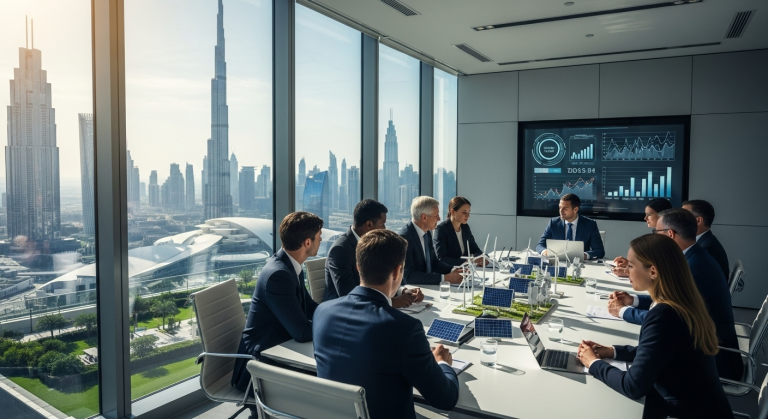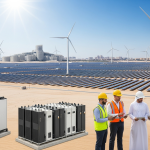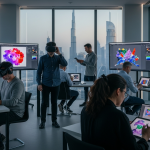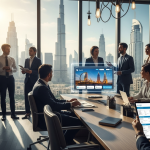Market Analysis and Opportunities
The United Arab Emirates, and Dubai in particular, is witnessing a dynamic shift toward renewable and sustainable energy solutions. This transformation is largely driven by ambitious UAE government initiatives such as the Dubai Clean Energy Strategy 2050, which targets 75% clean energy use by 2050, and growing investment opportunities in technology and sustainability. For entrepreneurs and investors, a Sustainable energy consulting firm operating in Dubai offers a timely business opportunity to capitalize on this high-growth market.
Target Market Analysis
- Market Size and Growth: The renewable energy market in the UAE is projected to grow at a CAGR of over 9% through 2027 (Mordor Intelligence). Dubai’s focus on solar, wind, and waste-to-energy projects makes it a beacon for regional sustainability.
- Key Trends: Corporate and government demand for energy audits, efficiency assessments, and green certifications is rising, as businesses seek compliance with global Environmental, Social, and Governance (ESG) standards.
- Consumer Preferences: Decision-makers in real estate, construction, manufacturing, and hospitality are increasingly proactive in integrating sustainability consulting into their operations, prioritizing both cost savings and brand reputation.
- Industry Trends: Digital transformation via IoT-based energy monitoring, AI-driven energy optimization, and data analytics is rapidly shaping the consulting landscape.
Marketing Needs
- Market Research: In-depth market research is essential for targeting sectors with the most urgent sustainability challenges (e.g., construction, hospitality, government projects).
- Digital Campaigns: Leveraging SEO, content marketing, and PPC ads focused on key phrases like “sustainable energy solutions Dubai” and “green consulting UAE” can boost online visibility.
- Branding Strategies: Developing a strong green brand identity—positioning as a thought leader on sustainability—will be crucial. Case studies and client testimonials can build trust in the market.
- Recommended Tactics: Localized social media campaigns, attending industry events, and featuring expert insights on platforms like the Persian Horizon blog can deliver credibility and attract high-value clients.
Expansion Potential
- New Market Segments: Opportunities lie in servicing government infrastructure projects, large-scale developers, and mid-market SMEs looking to improve energy efficiency.
- Geographic Growth: Expanding within the UAE—targeting Abu Dhabi, Sharjah, and Ras Al Khaimah—can amplify market reach. Further GCC expansion (Saudi Arabia, Oman, Bahrain) is viable as these nations replicate Dubai’s clean energy ambitions.
- Diversification: Scaling from B2B consulting into B2C (home energy audits, sustainability workshops) or even export consulting can establish new revenue streams.
Comprehensive Business Overview
A Sustainable energy consulting firm focuses on empowering businesses and government entities to transition toward greener, more cost-efficient energy consumption in the UAE. By advising clients on renewable energy adoption, regulatory compliance, and building energy-efficient strategies, the firm addresses today’s most urgent market demands.
Industry and Business Model
- Industry Focus: The firm operates within the renewable energy, sustainability, and environmental consulting sectors.
- Business Model: Revenue typically derives from project-based consulting, retainer agreements, and value-added services such as training, compliance audits, and technology integration.
- Target Audience: Corporates, real estate developers, government agencies, manufacturing companies, hospitality, and facility managers in Dubai and the broader UAE.
- Operational Scope: Services range from baseline energy assessments to the design and implementation of renewable systems, plus ongoing monitoring and compliance reporting.
Mission, Vision, and Core Objectives
- Mission: To drive sustainable development and reduce carbon footprints by delivering cutting-edge energy solutions tailored to the UAE’s unique environmental landscape.
- Vision: To become the leading advisor for sustainable energy transitions in Dubai and the MENA region.
- Core Objectives:
- Enable clients to achieve energy savings of 15–30% through optimized solutions.
- Support ESG compliance and government sustainability goals.
- Continuously innovate, leveraging emerging technologies in energy management.
Business Stage and Location
- Stage: Most firms enter at the startup or early growth stage, with rapid scaling possible due to high demand and government support.
- Location: A presence in a Dubai Free Zone (e.g., Dubai Multi Commodities Centre, Dubai Silicon Oasis) is recommended for streamlined business setup and 100% foreign ownership. However, DED Mainland licensing offers direct access to more local clients and government tenders.
Competitive Advantage
Unique Value Proposition (UVP) and Key Strengths
- Entrepreneur Perspective:
- Leverages the UAE’s pro-sustainability policies and government incentives for green businesses.
- First-mover opportunities in nascent segments like AI-driven energy analytics.
- Access to government grants and public-private partnerships for green infrastructure projects.
- Investor Perspective:
- High-growth sector with robust government backing and predictable ROI.
- Scalable, asset-light business model reduces upfront capital risk.
- Diversified income potential—consulting, technology integration, and ongoing sustainability outsourcing.
- Manager Perspective:
- Lean operational structure with minimal inventory and agile resource deployment.
- Strong client retention via contract-based services and recurring audits.
- Opportunity to form exclusive partnerships with technology providers or green certification agencies for enhanced credibility.
Financial and Investment Needs
Financial Requirements
- Setup Capital: AED 200,000–400,000 is typical for business setup, office space (Free Zone or co-working), professional licenses, website, and basic technology (ERP, CRM).
- Operational Expenses: AED 50,000–100,000 monthly covers payroll, utilities, marketing, and travel for client meetings.
- Marketing and R&D: Allocate AED 50,000–100,000 annually for digital campaigns, market research, and innovation in service offerings.
Investment Potential
- Investors benefit from entry into a regulated, high-potential market with rapid returns due to the asset-light model and recurring revenue streams.
- Scalability is enhanced by technology adoption and strategic alliances, enabling the firm to manage multiple simultaneous projects without proportional cost increases.
- Attractive investment models include equity partnerships or venture capital (for technology upgrades), convertible notes for early-stage funding, or pure debt to finance expansion.
Financial Risks and Mitigation
- Key Risks: Cash flow management, exposure to project delays, competitive pricing pressures, and high setup costs for premium talent.
- Mitigation Tactics:
- Create diversified service packages (retainers, audits, training) for revenue stability.
- Secure insurance for indemnity and project risks.
- Negotiate staged payments with clients to maintain liquidity.
- Engage financial advisors or leverage investment consulting services for optimal capital structuring and risk assessment.
Human Resources and Recruitment
Workforce Needs
- Core team: 7–15 employees, including energy auditors, sustainability consultants, project engineers, digital marketers, and admin support.
- Specialists: Project-based roles for MEP engineers, LEED/BREEAM experts, or smart technology integrators.
- Business development managers to drive client acquisition and partnership growth.
HR Challenges and Solutions
- Recruitment: Attracting bilingual talent (English/Arabic) with technical and sectoral expertise can be challenging.
- Retention: Competitive salaries, professional development plans, and performance-linked incentives can improve retention.
- Training: Onboarding programs and routine knowledge updates (e.g., on UAE regulations or green tech trends) are essential.
Compliance with UAE Labor Laws
- Align contracts with UAE Labor Law concerning visas, working hours, end-of-service gratuities, and occupational health and safety.
- Ensure all workers are on valid employment visas and that offer letters clearly spell out entitlements.
- Engage a legal consultant or refer to business setup services for compliance and regulatory support.
Infrastructure and Operations
Infrastructure Needs
- Physical office in a Dubai Free Zone, or cost-effective co-working space with conference facilities for client presentations and workshops.
- Digital infrastructure: Secure cloud-based file storage, ERP, CRM, and project management tools for scalable and remote operations.
- Specialized equipment: Energy audit tools, smart meters, and software for data analysis.
Operational Optimization
- Weaknesses: Manual recordkeeping, fragmented communication, or delayed reporting may hinder project delivery.
- Improvements: Adopt ERP/CRM for workflow automation, unify digital communication via collaboration suites, and implement lean project management.
- Supplier Relationships: Form strategic alliances with technology vendors and certification agencies for smooth, end-to-end service delivery.
Legal Compliance
- Register the company with DED (mainland) or relevant Free Zone authorities, securing trade licenses, environmental permits, and special consulting certifications if required.
- Open a dedicated corporate bank account in the UAE for transparent financial management.
- Consult legal experts to ensure compliance with new ESR (Economic Substance Regulations) and UAE anti-money laundering laws.
Innovation and Technology
- Use IoT sensors, advanced energy modeling software, and AI-based analytics for better client outcomes.
- Invest in R&D for custom technology solutions or platforms to differentiate the firm.
- Stay updated on global best practices via industry forums, exhibitions, and content on the Persian Horizon news page.
Marketing and Branding Strategies
Brand Status
- Strengths: Aligning brand messaging with Dubai’s sustainability goals fosters credibility and industry alignment.
- Areas for Improvement: Enhance trust through accredited certifications (LEED, ISO 50001) and ongoing thought leadership.
Marketing Channels
- Continue expanding SEO visibility for key services relevant to “business in Dubai” and “investment in UAE.”
- Broaden reach via LinkedIn, Instagram, and Facebook for B2B and B2C audiences.
- Utilize industry magazines, local business councils, and targeted PPC ads for niche sector penetration.
- Leverage email marketing to provide updates, case studies, and regulatory news.
360-Degree Campaigns
- Run multi-channel campaigns combining webinars, whitepapers, and social proof—from client testimonials to expert interviews.
- Participate in industry events, trade shows, and green expos (e.g., World Future Energy Summit).
- Incorporate smart retargeting and CRM-based outreach for post-engagement nurturing.
- Drive campaign effectiveness with professional support from Sales and Advertising Services.
Growth and Development Potential
Growth Strategies
- Launch new digital platforms or mobile apps for client self-service and real-time reporting.
- Pursue strategic partnerships with major property developers or government agencies.
- Expand into adjacent markets—such as water-saving or waste management consulting.
- Incentivize referrals from satisfied clients to build a robust sales pipeline.
Networking
- Engage actively with sustainability councils, business incubators, and UAE chamber of commerce networks.
- Leverage networks like Persian Horizon’s extensive 57-country platform for cross-border business and supplier links.
International Potential
- Use Dubai as a springboard for regional operations, leveraging its global air and sea connectivity.
- Assess exports of fast-growing consulting services to high-demand markets across the Middle East, Africa, and South Asia.
- Secure international partnerships or joint ventures to access new markets and credentials.
Sustainability and Innovation
- Align internal practices with green building standards and low-carbon operations.
- Regularly review service offerings to integrate latest energy innovations and regulatory changes.
- Showcase impact case studies—quantifying client energy/fossil fuel reductions—to underline value.
Alignment with Dubai’s Market
Cultural Alignment
- Multicultural team structures enable deep engagement with Dubai’s diverse business community.
- Tailor communication and presentations for both Arabic and English-speaking stakeholders.
- Wrap sustainability messaging in themes that resonate locally—innovation, prosperity, and social responsibility.
Local Regulatory Compliance
- Adhere strictly to UAE commercial, labor, tax, and economic substance laws for transparent operations.
- Periodically audit company practices and implement legal updates in partnership with local advisors.
Advantages of Dubai
- Tax-free environment and straightforward business registration attract global investors.
- World-class infrastructure—including connectivity, office facilities, and logistics—supports uninterrupted operations.
- Ready access to skilled labor pools and business accelerators for accelerated growth.
- Dubai’s strategic location helps serve both local opportunities and international trade, making it an ideal base for companies seeking to scale across borders.
Local Challenges and Practical Solutions
- High Competition: Differentiate through specialization in emerging niches and proprietary technology.
- Operational Costs: Use co-working spaces, hybrid work models, and digital platforms to manage overheads.
- Complex Regulations: Partner with credible advisors and use online portals to keep compliance seamless.
Conclusion
Dubai—and the wider UAE—offers an exceptional environment for a Sustainable energy consulting firm, driven by strong government backing, robust demand, and a business-friendly regulatory landscape. The sector’s high growth rates, combined with evolving client needs across industries, make this an attractive arena for entrepreneurs seeking Dubai business opportunities and for investors monitoring sustainable investment in the UAE.
Success, however, will rely on tailored market entry, a focus on technology and skilled talent, agile legal compliance, and a robust digital presence. Differentiation through innovative service offerings and alignment with Dubai’s cultural and regulatory context will be key to long-term profitability and impact.
For stakeholders ready to embark on this journey or scale their venture, specialized support is readily available. Visit Persian Horizon or discover their business setup services to power your transition to a sustainable and lucrative business in Dubai today.







